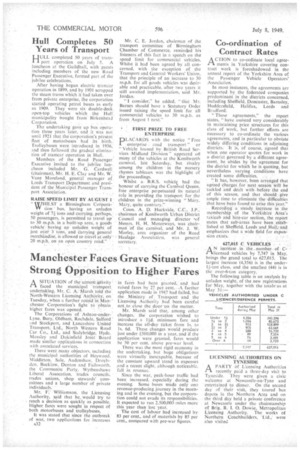Manchester. Faces Grave Situation: Strong Opposition to Higher Fares
Page 8

If you've noticed an error in this article please click here to report it so we can fix it.
A SITUATION of the'ltimoSti,ravity ti faced the munieipal transport, undertaking, Mr. C. AZIviarsh taltlythe North-Western Licensing Authority,on Tuesday, when a further ratindIti Manchester Corporation's fight to obtain higher fares was opened.
The Corporations of Ashton-underLyne, Bury, Oldham, Rochdale, Salford ' and Stockport, 'and Lancashire United Transport, Ltd.; North Western Road Car Co., Ltd., and Stalybridge, Hyde, Mosslcy and Dukinfield Joint Board made similar applications in connection with associated services.
There were many objectors, including the municipal authorities of Heywood. Middleton. Sale, .Audenshaw, Droylsden, Bucklow. Denton and Failsworth, the Communist Party, Wythenshawe Liberal Association, trades councils, trades unions, shop stewards' committees and a large numberof private individuals.'
Mr. 117.'Williamson. the Licensing Authority, said that he, wbuld try to reach a decision as quickly as possible. Higher fares were sought in respect of
both motorbuses and trolleybuses.
It was stated that 'since the outbreak of war, two applications for increases a32
' in fares had been granted,, and had raised fares by 27 per cent. -A further application made in 1947 had failed, but the _Ministry. of Transport and the Licensing Authority had been careful not,to close the ,dooron the matter.
Mr. Marsh said that. among other changes. .the corporation wished to introduce a lid. minimum fare and increase the all.day ticket from ls. to Is. 6d. These changes would produce just under £500,000 in a year, and if the application were granted, fares would be 50 per cent. above pre-war level.
There was the most rigid economy in the undertaking, but huge obligations were virtually inescapable, because of the constant upward trend in expenses and a recent slight, although noticeable, fall in revenue.
Since the war, peak-hour traffic had been increased, especially during the evening. Some buses made only one revenue-producing journey in the morning and in the evening, but the corporation could not evade its responsibilities. It expected to run 2.500,000 miles more this year than last -year.
The cost of labour had increased by 83 per cent., and of materials bY 85 per cent., compared with pre-war figures.


























